Why We Love Bolivia…
Bolivia, a place where vibrant culture, stunning landscapes, and rich history converge to create an unforgettable experience. From the otherworldly landscapes of the Uyuni Salt Flats to the colourful markets of La Paz, Bolivia offers a unique blend of authenticity and awe-inspiring beauty. Immerse yourself in the warmth of local hospitality, explore ancient ruins, and be captivated by the diverse ecosystems ranging from the Amazon Rainforest to the Andean highlands. Whether you seek adventure, cultural enrichment, or simply a breathtaking escape, Bolivia offers an array of captivating experiences waiting to be uncovered.
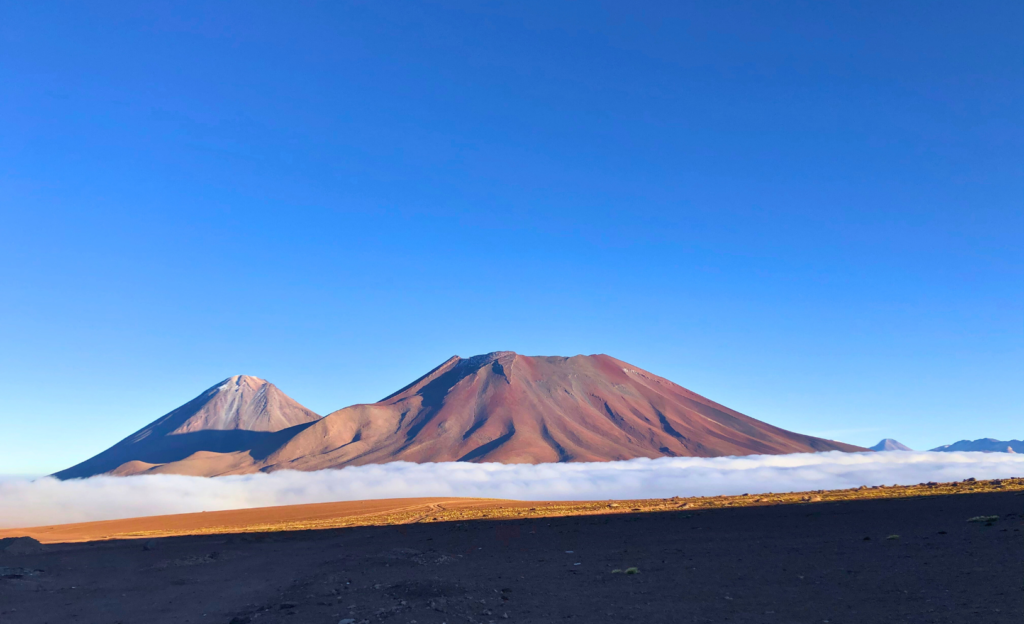
Entry Requirements
Passports
To enter Bolivia, your passport should have an ‘expiry date’ at least 6 months after the date you arrive.
Visas
When planning your journey to Bolivia, keep in mind that a visa is not required for stays up to 90 days. Upon arrival, border officials typically issue 30-day stamps, but for an extended 90-day stay, you can apply in person at the nearest immigration office in Bolivia.
Ensure you receive an entry stamp upon arrival, as the absence of one may result in fines upon departure. If entering Bolivia overland, remember to obtain passport stamps on both sides of the border—exit stamp from the departing country and an entry stamp from Bolivia.
While Bolivia no longer stamps passports at the Argentina border, it is crucial to register your exit with Argentina’s immigration authorities, who then relay the information to Bolivian immigration.
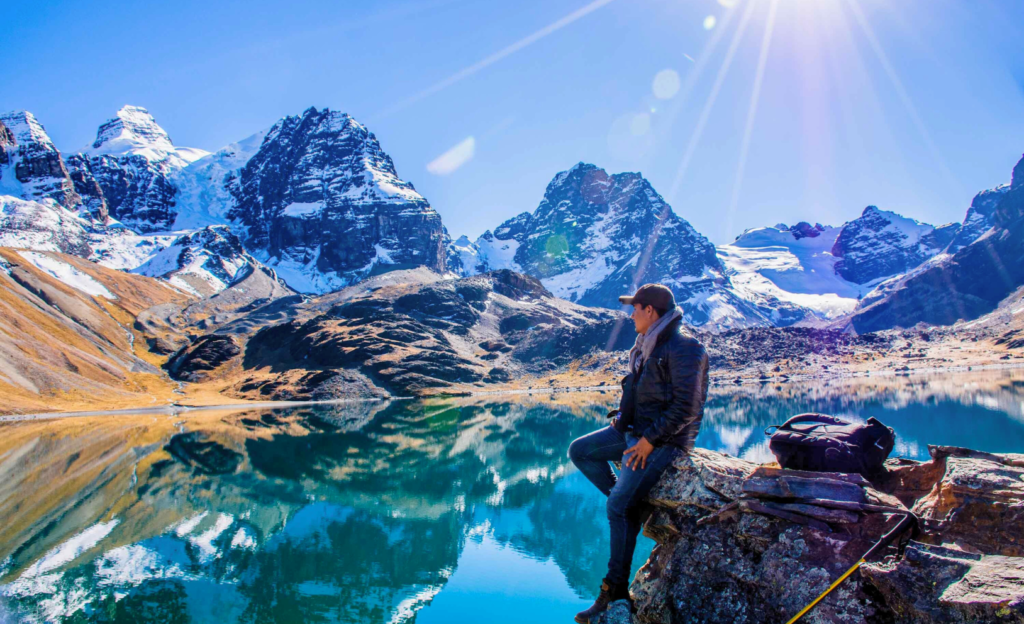
Transport
Flights
Given Bolivia’s vast and varied terrain, domestic flights are the most practical solution for covering expansive distances quickly and connecting all major cities. If we have booked your internal flights, we will provide you with your flight ticket before you depart. However, you will still be required to check-in, to receive your boarding passes. We recommend doing this via the airline’s app or the online website, 24 hours before departure. You can input the reference provided on your ticket, along with your surname, to access your booking.
We recommend being at the airport at least 2 hours before the departure for domestic flights, and at least 3 hours for international flights.
Transfers/Taxis
We’re able to arrange your transfers for you, just let us know your flight number, and we’ll plan the route and let you know the cost! We can also arrange your transfers between hotels/regions for multi-stop trips. Should you need to order a taxi, we recommend using the Uber app.
Trains
Traveling by train is not only an efficient mode of transportation but also a delightful journey through some of Bolivia’s most stunning landscapes – our travel experts can organise this for you.
Boats and Ferries
Exploring Bolivia’s water-rich regions, such as the Amazon Basin, is an incredible experience with boat and ferry services. Again, if you’re interested in visiting the lesser known part of the amazon, our travel experts can help organise this!
Whether you’re soaring above the Andean landscapes, weaving through urban streets, or cruising along Bolivia’s waterways, our experts can recommend the easiest ways of getting around and ensuring you enjoy nice views along the way!
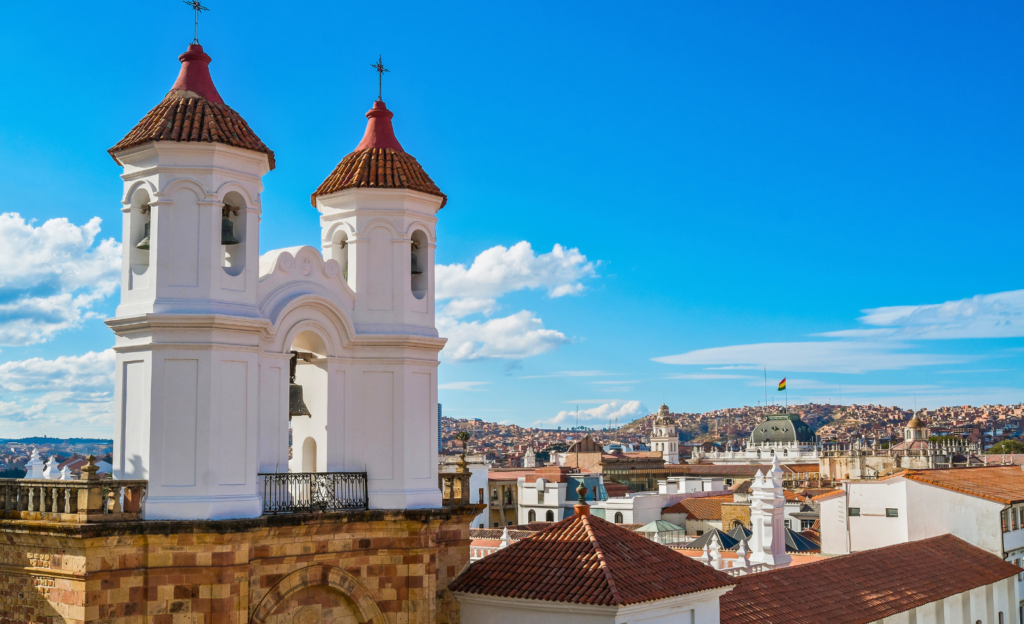
Climate
Bolivia’s climate varies widely due to its diverse landscapes, including high-altitude mountains, tropical rainforests, and arid plains. It’s essential to pack accordingly for the regions you plan to visit.
Highlands (e.g., La Paz, Uyuni)
Daytime temperatures: Can range from cool to mild, depending on altitude.
Nighttime temperatures: Can drop significantly, especially at higher elevations.
Weather: Dry and sunny during the day; cold at night.
Altitude sickness: Prepare for altitude sickness if travelling to high-altitude regions. Take necessary precautions and acclimatise gradually.
Tropical Lowlands (e.g., Amazon Basin)
Daytime temperatures: Hot & Humid.
Nighttime temperatures: Warm and muggy.
Weather: Rainy season (November to March) brings heavy rainfall; dry season (April to October) has less precipitation but is still humid.
Insect protection: Mosquito repellent, long-sleeved clothing, and mosquito nets are recommended due to the prevalence of mosquitoes and the potential risk of mosquito-borne diseases like malaria and dengue fever.
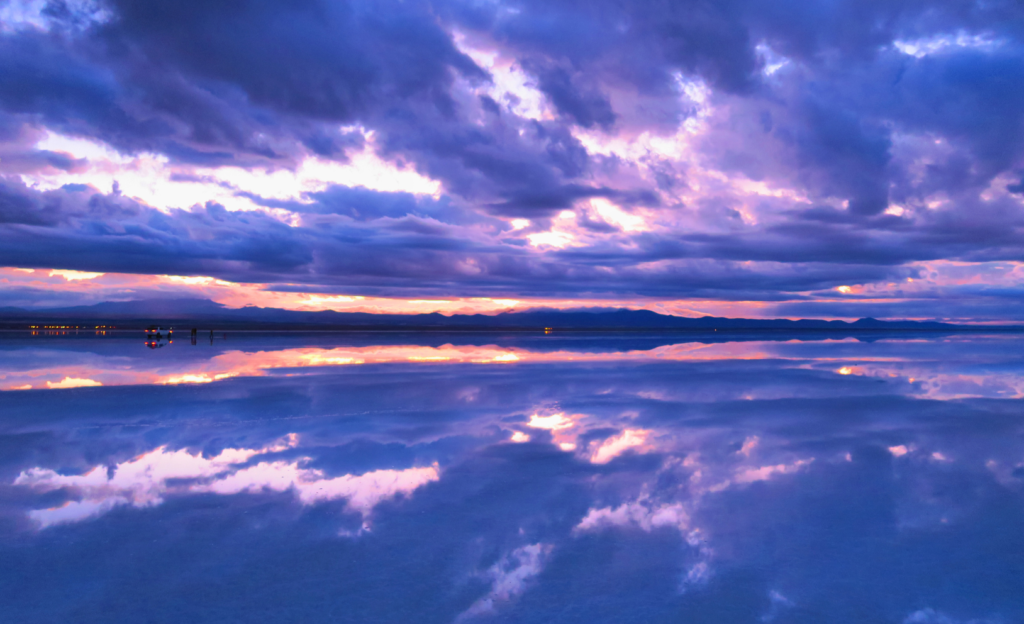
Laws and Customs
Environmental Conservation: Bolivia boasts stunning natural landscapes, including the Amazon rainforest and the Andes mountains. Respect the environment by minimizing waste, avoiding single-use plastics, and following designated hiking trails in these fragile ecosystems.
Safety Precautions: Exercise caution in crowded areas, especially in urban centres, to prevent theft or pickpocketing. Stay informed about local safety conditions and adhere to any travel advisories issued by your embassy or consulate.
Photography: Always ask for permission before taking photos of individuals or religious ceremonies, as some may consider it disrespectful or intrusive.
Respect for Indigenous Cultures: Bolivia’s population is diverse, with a significant indigenous presence. Show respect for local customs, traditions, and beliefs, especially when visiting indigenous communities or sacred sites.
Plug Type
In Bolivia, the plug type used is Type A and Type C. These plugs have two round pins (Type A) or two round pins with two round grounding pins (Type C). If you’re travelling to Bolivia, make sure your electronic devices are compatible with these plug types, or bring appropriate adapters for charging your devices.
Currency
The official currency of Bolivia is the Bolivian Boliviano, abbreviated as BOB. When travelling to Bolivia, it’s advisable to exchange your currency for Bolivianos upon arrival at banks, currency exchange offices, or ATMs. Additionally, major credit cards are accepted in larger cities and tourist areas, but it’s always a good idea to carry cash for smaller purchases and transactions in more remote areas.
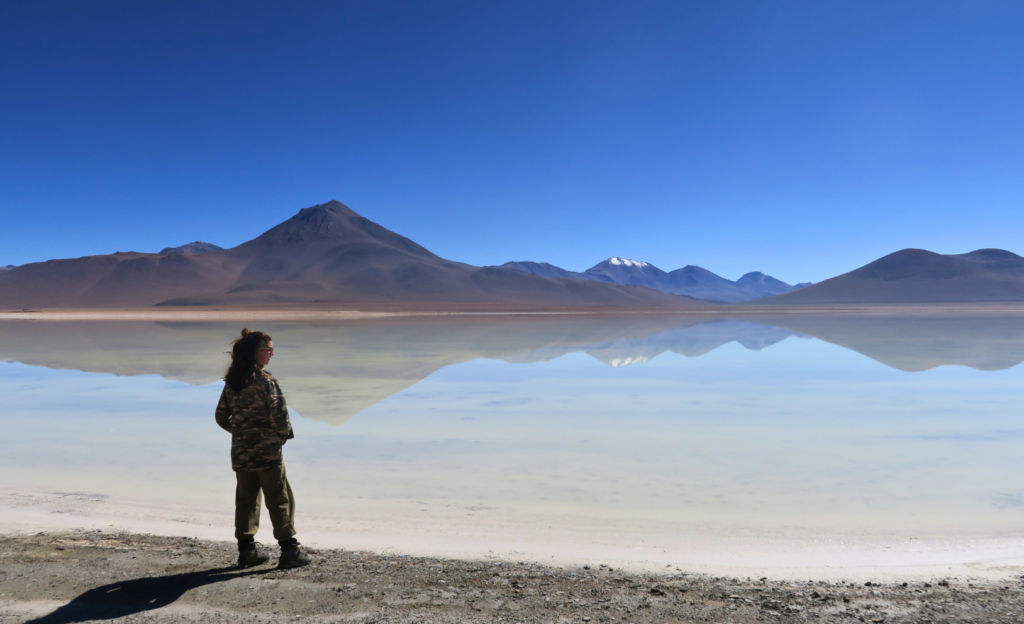
What To Pack
Clothing:
– Lightweight, quick-dry clothing for warmer regions.
– Warm layers (e.g., fleece jackets, thermals) for cooler highland areas.
– Waterproof jacket/poncho for rainy seasons and highland regions.
– Comfortable walking shoes/hiking boots, for exploring uneven terrain.
– Hat, sunglasses, and sunscreen for sun protection at high altitudes.
– Swimwear if visiting hot springs or tropical lowlands.
Health and Safety:
– Altitude sickness medication (if travelling to high-altitude areas).
– Insect repellent and mosquito nets for tropical lowlands.
– If you are travelling to remote areas, we recommend a basic first aid kit with essentials like pain relievers, bandages, and antiseptic cream.
Miscellaneous:
– Daypack or small backpack for day trips and excursions.
– Reusable water bottle.
Electronics:
– Electrical adapter.
– Reliable power bank, for charging while exploring remote areas or on long journeys.
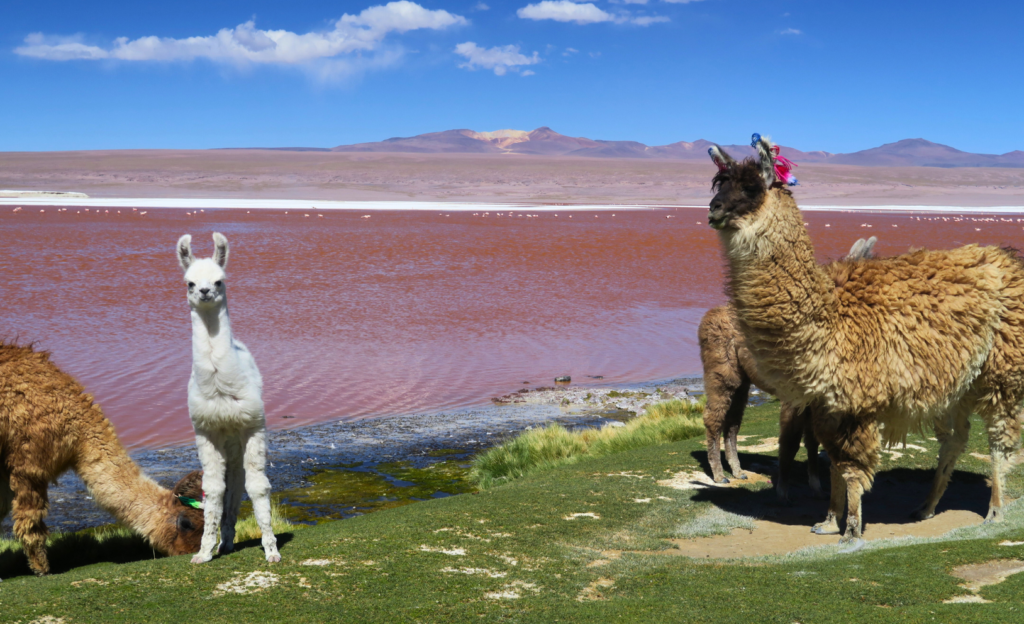
Vaccinations
We aren’t certified to give medical advice so always recommend you consult your doctor or a travel doctor, as they will know which vaccinations you have already and any additional ones necessary for your trip. You can also take a look here for travel vaccination information and advice on bringing medication into the country.
Tipping
Tipping in Bolivia varies by service type and location. While a service charge is often included in restaurant bills, an additional 5-10% tip for good service is appreciated. For guided tours and transportation, 10-15% is customary, while hotel staff may receive small tips of $1-2 USD per day for housekeeping or assistance with luggage. Unlike some countries, tipping taxi drivers is not common practice.
Flights & Time Zone
The total flight duration from London to Bolivia on average is 12 hours, 44 minutes.
Bolivia is GMT -4.
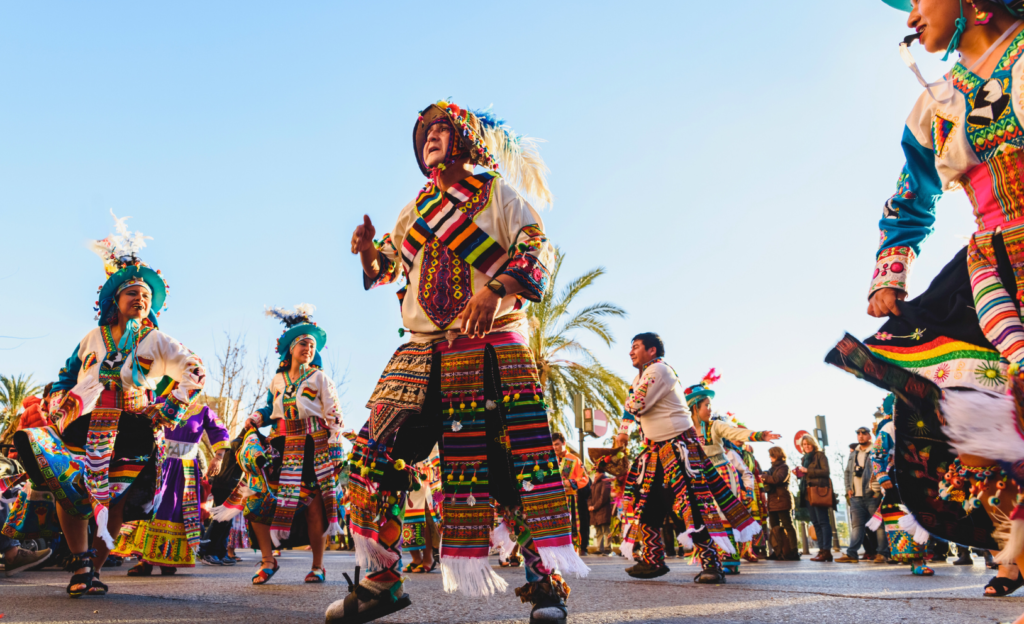
Language
Spanish is the official and most widely spoken language in Bolivia. However, Bolivia is also home to numerous indigenous languages, such as Quechua, Aymara, and Guarani, which are spoken by various indigenous communities throughout the country. In tourist areas and major cities, you may find English spoken to some extent, particularly in hotels, restaurants, and tourist attractions. Still, having a grasp of some basic Spanish phrases can greatly help your travel experience and allow for more meaningful interactions with locals. We recommend downloading the Google Translate App which offers a Spanish file to download that can still be used while offline.
Food
On your travels, enjoy traditional Bolivian dishes like salteñas (savoury pastries filled with meat, vegetables, and spices), anticuchos (grilled skewers of marinated meat), and pique a lo macho (a hearty dish featuring beef, sausage, and potatoes). Don’t miss the chance to try quintessential Bolivian specialities like quinoa soup, llama or alpaca meat dishes, and freshly baked empanadas. For a refreshing beverage, indulge in chicha morada (a purple corn drink) or api (a warm, sweet beverage made from purple maize).
